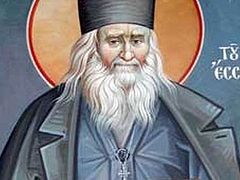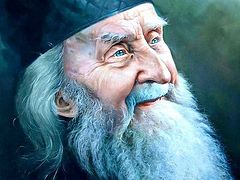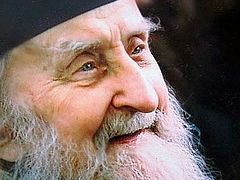 There are many published letters by St. Sophrony (Sakharov), along with portions of his spiritual talks. One can poignantly see from these writings just how deeply he felt the human condition, and at the same time, how profoundly he knew what labors and tears were needed to bring man’s soul out of its prison. We cite here some of these timeless words.
There are many published letters by St. Sophrony (Sakharov), along with portions of his spiritual talks. One can poignantly see from these writings just how deeply he felt the human condition, and at the same time, how profoundly he knew what labors and tears were needed to bring man’s soul out of its prison. We cite here some of these timeless words.
There is no greater sin than war
Written in 1975 (translated from the Russian on the website Athonite).
For me, the period of war coincided with the time I lived on Mt. Athos. My dwelling was a cave in the ridges of a steep, almost hanging cliff, which was beaten day and night by sea waves; and I could feel their blows as I lay on my less than soft bed.
During those terrible days, all of Europe rested from steamships, ferryboats and caiques, and I had more silence possibly than during peacetime. O, this was a time of increased prayer for the world and throughout the world, especially for Russia.
I had heard a number of times that the fascists intended to finish Russia off. Their officers did not hide their genocidal plans: to give away the conquered territory to the soldiers who fought on the “eastern” (for the Germans) front, leaving of the Russians around thirty million laborers on the earth without the right to education; because they did not consider Russians to be humans (unter-menschen), but beasts of burden.
To our great happiness, “God did not allow the Germans to eat them!”
Thirty years have passed but peace has not yet been attained, the darkness has not been dispersed, and the light of love is not yet brightly illumining the earth. In those nightmarish years I prayed long hours, especially at night. I wept in my prayers “for peace to the whole world”, especially for Russia, for the Russian people, who were being threatened with nearly total destruction.
The history of mankind is filled with all kinds of crimes, but there is no greater crime than war, especially in our times, “world wars”, when all people are in one way or another drawn into “fratricide”. Today one “rejoices” that hundreds of thousands are killed, and even millions “on one side”; tomorrow the victims rejoice that revenge has been gotten over the murderers. And thus the entire world is enveloped in hellish hatred, the Holy Spirit abandons people’s souls, and despair takes hold of their hearts…
* * *
The following excerpts are from the book, Words of Life, extracts from Fr. Sophrony’s spiritual talks, published by the Monastery of St. John the Baptist in Essex (1996).
Depression
The word accidie means etymologically, “lack of care”, i.e, about one’s salvation. With few exceptions, all humanity is now living in a state of accidie. People become indifferent about their salvation. They do not seek divine life. They confine themselves to forms of life which appertain to the flesh, to everyday needs, to the passions of this world, to mundane activities. God, though, created us out of nothing, in the image of the Absolute and after His likeness. If this revelation is true, the absence of concern for salvation is nothing else than the death of the human person.
Despair is the loss of consciousness that God wants to give us eternal life. The world is living in despair. People have condemned themselves to death. We must struggle resolutely against despondency.
The wisdom of this world
The wisdom of this world cannot save the world. The parliaments, the governments, the complex organizations of the most advanced contemporary states, are powerless. Humanity suffers without limit. The only solution is to find within us the wisdom and the resolve not to live according to the ideas of this world, but to follow Christ.
How can we find our way? According to the Gospel, Christ is our way.
Love your enemies
“Love your enemies.” Yes, it is difficult. Yes, it is painful, But the moral beauty of Christ attracts us to such a degree that we are ready to bear all trial, as long as we are being raised up into His Spirit. There is no other choice.
Christ has given His divine life to those who are created in His image, but the only response He received was hatred. Today, after two thousand years of Christianity, what do we see? The contemporary world is losing Christ, losing eternal life, more and more. The deep darkness of sinful passions, hatred, domination, wars of all kinds, are what make up our earthly existence. In this situation, Christ has given the commandment to those who decide to follow Him: “Love your enemies.” Why is the world afraid of such a God? Con one find a better principle than this: bless those who curse you, love your enemies?
Suffering
One cannot love without suffering. The greatest pain is that of loving to the utmost. Christ loved so much that He gave Himself up to a terrible death. The saints too. Paradise always costs this price. Prayer for the world is the fruit of extremely deep and acute suffering.
When we decide to follow Christ, every day of our life becomes a day of suffering, of weeping, of pain. Sometimes this question arise in us: “Lord, why hast Thou created us thus, that we must go through so much suffering?” We do not manage to understand that this negative experience is the way of salvation.
Earthly existence is for man an endless suffering. Why do we bear all this? Because the Creator has come and has dwelt among us. And we now know Him personally.
Repentance
Of course, it is better not to sin. But repentance, if it is like a flame, can restore every loss.
We must preserve the spirit of repentance all our life, right to the end. Repentance is the basis of all ascetic and spiritual life. The feeling, or intuition, of sin can become so acute in us that it really engenders a repentance from the depths of our being.
We may weep for hours, for weeks, for years, before our being is completely regenerated by the word of Christ, by His commandments, and above all, by the grace of the Holy Spirit. This transformation of our being, after the fall of Adam, requires great efforts. And a long time.
Repentance has no end on earth, because the end of repentance would mean that we had become like Christ in everything. The least difference between Christ and ourselves requires of us deep repentance: “Lord Jesus Christ, Son of God, have mercy upon us.” This word expresses the difference that we feel between Him, the absolute and eternal Being, and ourselves. “If we are not really like the Lord in all things, how can we dwell eternally with Him?” wonders Saint Symeon the New Theologian. For Him, as for us, it is impossible. The only thing that remains for us is to have patience.
The way towards knowledge of God goes above all via faith, the love of Christ, and repentance.
May God give you all the spirit of repentance. Weep over your faults; weep, that your heart may not dry up.




